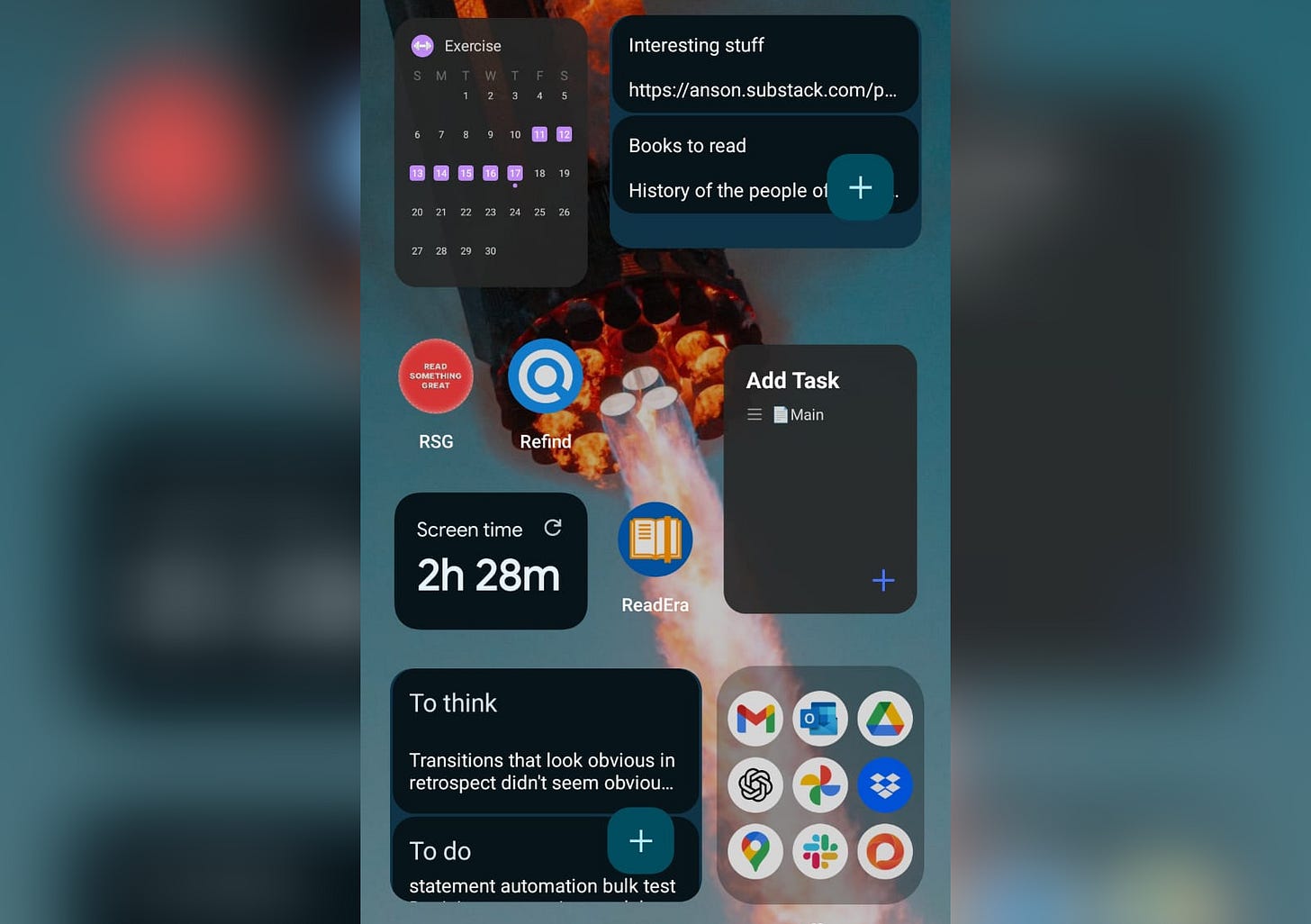
New article
Wrote about how I used a trick to increase rating of an app on Google Play Store from 3.4 to 4.3 and how others can too (also made some changes to the homepage of my website)
talhaashraf.com/increasing-app-rating
Personal tidbit
Gave my 2 year old nephew a haircut while he was asleep because he would not get it done otherwise and it came out looking surprisingly well. (Putting that polymath title to full use)
AI stuff
Google is now back in the AI game and their models are new really good. But the API does not have caching which means it is way too expensive to use for now. I went through $30 in less than 30 minutes without noticing.
Thought
If you create a WhatsApp bot for a bank, the first question they ask the bot is “who are you?“ which no actual user would ask because users will get to the WhatsApp chat from the bank website and the number will already have name of the bank as identifier.
But when building for users of a business you’re actually building for the owner of the business. That is why banks building solutions for a gen-z audience build a solution based on a middle-aged manager’s idea of gen-z users instead of actual gen-z users. It might serve banks well to pay an actual gen-z kid to give feedback in this case.
Niche stuff
Infobip requires a custom prefix in authorization headers when making an API call and Cloudflare Worker (ironically) does not work with a custom prefix header. This was a dumb bug to troubleshoot.
Interesting blog links
Talented engineers are rare — vastly rarer than opportunities to use them — and it is a seller’s market for talent right now in almost every facet of the field. Everybody at Matasano uses Ruby. If you don’t, but are a good engineer, they’ll hire you anyway. (A good engineer has a track record of — repeat after me — increasing revenue or decreasing costs.) Much of Fog Creek uses the Microsoft Stack. I can’t even spell ASP.NET and they’d still hire me.
kalzumeus.com/2011/10/28/dont-call-yourself-a-programmer
To make a change, most people don’t do enough… To make a change, you have to be extreme. Go all the way the other way. It will feel like overcompensating, but you have to stack a huge pile of bricks on the other side.
curiousmaverick.com/overcompensate-to-compensate
Agency. Its presence is little noted, but its absence causes great distress. — Sundus
curiousmaverick.com/do-you-have-agency
“How do you become a billionaire in the space industry?” “Easy, you start with two billion dollars"
thepsmiths.com/p/review-reentry-by-eric-berger
Once you have a visceral sense of what interest is supposed to feel like, you can iterate on your social/information environment to amplify that. When you talk to people, you can (probably already) tell who makes you feel more attuned to your curiosity. Spend more time with them.2 Given enough time, you can gradient descent to a social/information environment where basically everything you encounter makes you feel connected to yourself.
henrikkarlsson.xyz/p/a-measuring-device-that-tells-me
Why is this so hard? Because you’re utterly habituated to steady progress—to completing things, to producing, to solving. When progress is subtle or slow, when there’s no clear way to proceed, you flinch away. You redirect your attention to something safer, to something you can do. You jump to implementation prematurely; you feel a compulsion to do more background reading; you obsess over tractable but peripheral details. These are all displacement behaviors, ways of not sitting with the problem. Though each instance seems insignificant, the cumulative effect is that your stare rarely rests on the fog long enough to penetrate it. Weeks pass, with apparent motion, yet you’re just spinning in place. You return to the surface with each glance away. You must learn to remain in the depths.
henrikkarlsson.xyz/p/morning-ritual
Small talk is a type of conversation that is intentionally 'content-less.' By being rote and repetitive, you can talk without thinking too much and instead pay attention to non-verbal cues so you can assess the state of the person you are talking to. You feel each other’s energy levels and notice if the conversation seems to pull in a certain direction, or if they seem distracted by something.
(paywall) henrikkarlsson.xyz/p/living-80-years-you-can-have-8-lives
I sometimes take a piece of paper and list essay ideas. Then I take the best idea and start fleshing it out. I have only written mediocre essays this way. Good essays arrive like gifts when I am not looking for them.
(paywall) henrikkarlsson.xyz/p/how-i-wrote-looking-for-alice
"Listening to my inner narrator trying to make sense of what is going on has been (almost) amusing. It is amusing because objectively speaking the reason I’m feeling blue is no mystery: in September, I put up 5 exhibitions and published ~20,000 words while homeschooling our kids and helping the carpenters change the roof of our house—my system is predictably out of balance. Underslept, overstressed. But the funny thing is that the voice in my head refuses to acknowledge that what is going on inside me has anything to do with these trivial bodily needs. Instead, it comes up with these outlandish conspiracy theories about why things feel bad, “Oh, what if you are on the wrong path? Perhaps you’ve misunderstood some part of the byzantine EU tax code and they’ll take your house? And . . . what if that scratchy itch on your head is cancer?”
It is like those cases where people with epilepsy get their brain halves surgically disconnected. The researchers whisper a dirty joke in the ear connected to the part of the brain that doesn’t control speech. The subject giggles. Then the researchers ask the other ear why they giggled, and the subject says, “Oh, that cabinet looks so funny!”
The narrator in my head is like that. It is 100 % sure that it is right, even though it is disconnected and ignorant of the parts of the system that are causing the problem. It would make a good political pundit"
henrikkarlsson.xyz/p/modular-life-meaningful-work
It’s useful to focus on adding another zero to whatever you define as your success metric—money, status, impact on the world, or whatever. I am willing to take as much time as needed between projects to find my next thing. But I always want it to be a project that, if successful, will make the rest of my career look like a footnote.
Most people get bogged down in linear opportunities. Be willing to let small opportunities go to focus on potential step changes.
I think the biggest competitive advantage in business—either for a company or for an individual’s career—is long-term thinking with a broad view of how different systems in the world are going to come together. One of the notable aspects of compound growth is that the furthest out years are the most important. In a world where almost no one takes a truly long-term view, the market richly rewards those who do.
If you don’t believe in yourself, it’s hard to let yourself have contrarian ideas about the future. But this is where most value gets created.
Most highly successful people have been really right about the future at least once at a time when people thought they were wrong. If not, they would have faced much more competition.
blog.samaltman.com/how-to-be-successful

